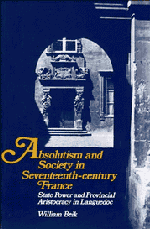 Absolutism and Society in Seventeenth-Century France
Absolutism and Society in Seventeenth-Century France Published online by Cambridge University Press: 05 July 2011
By the 1670s a new mood of jubilant collaboration seemed to have taken over the governing bodies of Languedoc. The glories of Louis XIV were evoked more and more frequently in the most glowing of terms: ‘can one ever marvel enough at the wonderful order of his finances, at the advantageous reestablishment of commerce and his maritime forces; can one ever admire sufficiently the defenses of his conquered fortifications, the warring genius of his people, their prompt obedience…’ Obsequious conformity seemed to be the order of the day. In late 1671, when the first vote of the don gratuit in the single deliberation without any bargaining by the Estates was achieved, Colbert was showered with self-congratulatory epistles from the responsible parties: ‘I consider myself at once very glorious and very happy to be at the head of this assembly the first time that it accepted the don gratuit unanimously.’ ‘It was the most delicate pleasure imaginable…to support the view most agreeable and useful to His Majesty.’ ‘The assembly wants to remain in the king's good graces and to do his bidding in a submissive fashion.’ ‘The vote was unanimous once the royal commissioners gave their word that the king would be satisfied.’
From expressions like these it is easy to draw an exaggerated picture of provincial passivity and institutional subservience, especially since there is considerable truth in the contention that the entire governmental system worked more smoothly under Louis XIV.
To save this book to your Kindle, first ensure [email protected] is added to your Approved Personal Document E-mail List under your Personal Document Settings on the Manage Your Content and Devices page of your Amazon account. Then enter the ‘name’ part of your Kindle email address below. Find out more about saving to your Kindle.
Note you can select to save to either the @free.kindle.com or @kindle.com variations. ‘@free.kindle.com’ emails are free but can only be saved to your device when it is connected to wi-fi. ‘@kindle.com’ emails can be delivered even when you are not connected to wi-fi, but note that service fees apply.
Find out more about the Kindle Personal Document Service.
To save content items to your account, please confirm that you agree to abide by our usage policies. If this is the first time you use this feature, you will be asked to authorise Cambridge Core to connect with your account. Find out more about saving content to Dropbox.
To save content items to your account, please confirm that you agree to abide by our usage policies. If this is the first time you use this feature, you will be asked to authorise Cambridge Core to connect with your account. Find out more about saving content to Google Drive.